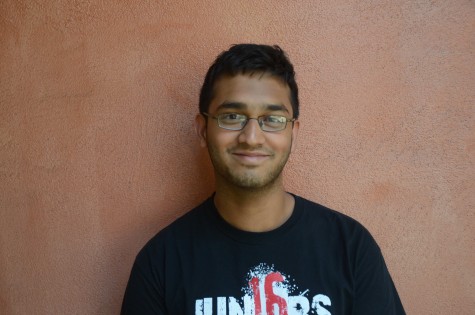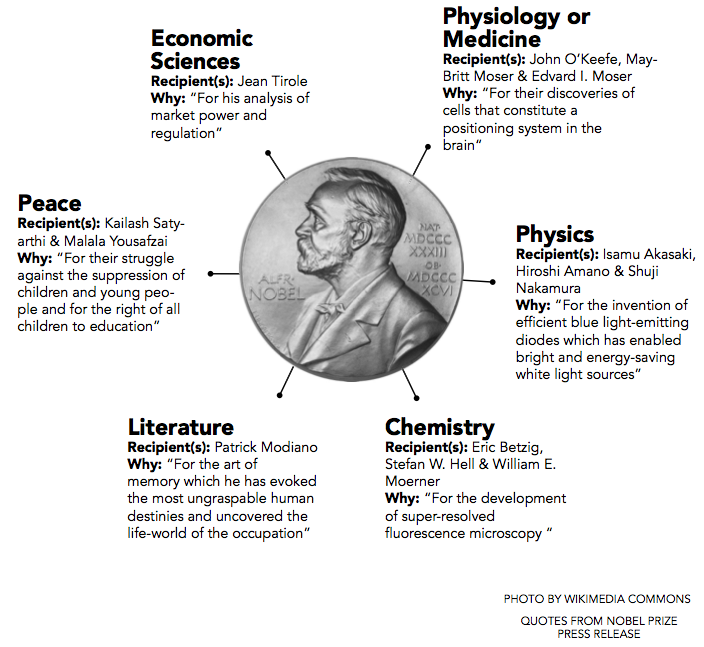From brains to human rights: Nobel Prizes awarded
The recipients of the Nobel Prizes for physiology or medicine, physics, chemistry, literature, peace and economic sciences have been announced this month, including one Stanford professor.
The Nobel Foundation, established in 1901 by Alfred Nobel, awards each laureate a gold medal, a diploma, and a cash award depending on the income of the foundation.
William E. Moerner, a professor of chemistry at Stanford University, was one of three recipients of the Nobel Prize in chemistry. Along with Eric Betzig and Stefan W. Hell, he won the prize for bringing “optical microscopy into the nanodimension,” according to the official Nobel Prize press release.
Science department chair Anita Chetty commented on the concept behind the Nobel Prizes.
“What they’re looking for is either research that has completely changed the direction of other research or that has applications in multiple areas,” she said.
Biology teacher Mike Pistacchi expressed appreciation for the awards.
“I do like that there is a major prize, with monetary value, for research scientists, especially those involved in pure research rather than product development,” he said.
Other teachers were more skeptical about the awards’ value.
“So many fields of science have become more collaborative. I believe each award can only be shared by up to three individuals, yet many discoveries are the combined efforts of a much larger team,” Physics and Research Methods teacher Chris Spenner said.
Computer Science Department Chair Dr. Eric Nelson said that recently the prizes have become suspect to politics.
“I think the prizes in science, medicine and economics tend to accurately reflect the recognition of lasting achievements. There is some politics in the selection process, but truly great achievements cannot be ignored,” Nelson said.
1975 physiology or medicine Nobel Prize recipient David Baltimore spoke about his work to develop a treatment for HIV at the Harker Research Symposium in the spring of 2013.
“His presence at the Symposium […] elevated [it] to another level,” Chetty said. “In other words, this was more than just a high school science fair.”
The award ceremony for these prizes will take place on Dec. 10. Visit Harker Aquila (www.harkeraquila.com) for live coverage of the prizes.
This article was published in the pages of The Winged Post on Oct. 17, 2014.

Praveen Batra (9) is a reporter for the Winged Post. He enjoys informative writing, design, and typography. In his spare time, he likes to write mobile...

Vineet Kosaraju (12) is the STEM Editor for both Harker Aquila and Winged Post. He is a senior and has been part of the journalism program for the past...


















![“[Building nerf blasters] became this outlet of creativity for me that hasn't been matched by anything else. The process [of] making a build complete to your desire is such a painstakingly difficult process, but I've had to learn from [the skills needed from] soldering to proper painting. There's so many different options for everything, if you think about it, it exists. The best part is [that] if it doesn't exist, you can build it yourself," Ishaan Parate said.](https://harkeraquila.com/wp-content/uploads/2022/08/DSC_8149-900x604.jpg)




![“When I came into high school, I was ready to be a follower. But DECA was a game changer for me. It helped me overcome my fear of public speaking, and it's played such a major role in who I've become today. To be able to successfully lead a chapter of 150 students, an officer team and be one of the upperclassmen I once really admired is something I'm [really] proud of,” Anvitha Tummala ('21) said.](https://harkeraquila.com/wp-content/uploads/2021/07/Screen-Shot-2021-07-25-at-9.50.05-AM-900x594.png)







![“I think getting up in the morning and having a sense of purpose [is exciting]. I think without a certain amount of drive, life is kind of obsolete and mundane, and I think having that every single day is what makes each day unique and kind of makes life exciting,” Neymika Jain (12) said.](https://harkeraquila.com/wp-content/uploads/2017/06/Screen-Shot-2017-06-03-at-4.54.16-PM.png)








![“My slogan is ‘slow feet, don’t eat, and I’m hungry.’ You need to run fast to get where you are–you aren't going to get those championships if you aren't fast,” Angel Cervantes (12) said. “I want to do well in school on my tests and in track and win championships for my team. I live by that, [and] I can do that anywhere: in the classroom or on the field.”](https://harkeraquila.com/wp-content/uploads/2018/06/DSC5146-900x601.jpg)
![“[Volleyball has] taught me how to fall correctly, and another thing it taught is that you don’t have to be the best at something to be good at it. If you just hit the ball in a smart way, then it still scores points and you’re good at it. You could be a background player and still make a much bigger impact on the team than you would think,” Anya Gert (’20) said.](https://harkeraquila.com/wp-content/uploads/2020/06/AnnaGert_JinTuan_HoHPhotoEdited-600x900.jpeg)

![“I'm not nearly there yet, but [my confidence has] definitely been getting better since I was pretty shy and timid coming into Harker my freshman year. I know that there's a lot of people that are really confident in what they do, and I really admire them. Everyone's so driven and that has really pushed me to kind of try to find my own place in high school and be more confident,” Alyssa Huang (’20) said.](https://harkeraquila.com/wp-content/uploads/2020/06/AlyssaHuang_EmilyChen_HoHPhoto-900x749.jpeg)



